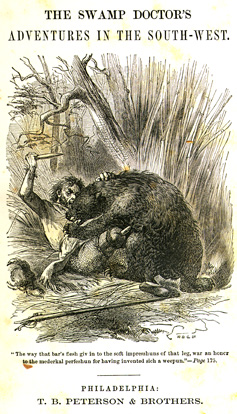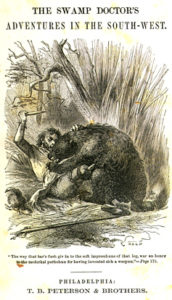Henry Clay Lewis
Henry Clay Lewis trained as a doctor in Louisiana and also contributed to the nineteenth-century literary genre of southwestern humor.

Courtesy of University of North Carolina Chapel Hill
"The Swamp Doctors Adventures in the South-West" by Henry Clay Lewis. Lewis, Henry Clay (Author)
Physician and humorist Henry Clay Lewis was among the most prominent writers working in the genre of southwestern humor, a type of literature that flourished in the southeastern United States between 1830 and 1865. A native of South Carolina, Lewis migrated to the swamps in Madison Parish, where he worked as a rural doctor. Publishing under the pseudonym Madison Tensas, M.D., Lewis wrote stories based on his personal experiences, many of which are included in Odd Leaves from the Life of a Louisiana “Swamp Doctor,” a collection of stories published in 1850. Like other authors in the genre, Lewis frequently depicted humorous clashes between polite and primitive cultures and used dialect for comic effect.
Born June 26, 1825, in Charleston, South Carolina, Henry Clay Lewis was the seventh child of David and Rachel Saloman Lewis. The family moved to Cincinnati when Lewis was young. Following the death of his mother in 1831, Lewis was raised by several older brothers, including one in Yazoo City, Mississippi, but often felt unwanted and alienated. He became a medical apprentice in 1842 and subsequently attended the Louisville Medical Institute, where he completed his medical degree. Settling in a remote part of Madison Parish on the Tensas River, Lewis not only practiced medicine but also began publishing humorous sketches in the Spirit of the Times, a weekly New York sporting paper known for publishing works in the southwestern humor genre.
Much of the subject matter for Lewis’s work was derived from his encounters with planters, farmers, slaves, swamp dwellers, and hunters in the region. In the twenty-two semi-autobiographical sketches collected in Odd Leaves from the Life of a Louisiana “Swamp Doctor,” Lewis employs Tensas, an old swamp doctor, to recount his experiences. Often these stories comically reveal his personal shortcomings as a medical student and physician whose lack of experience causes him to unintentionally inflict pain on his patients. One of the most enigmatic and complex antebellum southern humorists, Lewis often depicted the grotesque, bizarre, and horrifying within a comic framework. In the story “The Indefatigable Bear Hunter,” for example, a hunter’s leg is amputated after a bear attack. In an ironic twist, the hunter later uses his wooden leg to defend himself from another bear attack.
As Edwin T. Arnold has perceptively observed, beneath Lewis’s surface of humor, he depicts the “disturbed, the deformed, and the dispossessed, the physical and psychological ‘monsters’ who inhabit the borderlands between solid earth and liquid swamp, and between the rational world and the world of madness.” Lewis’s use of the grotesque foreshadowed much of what was to come in southern literature. He died August 5, 1850.
